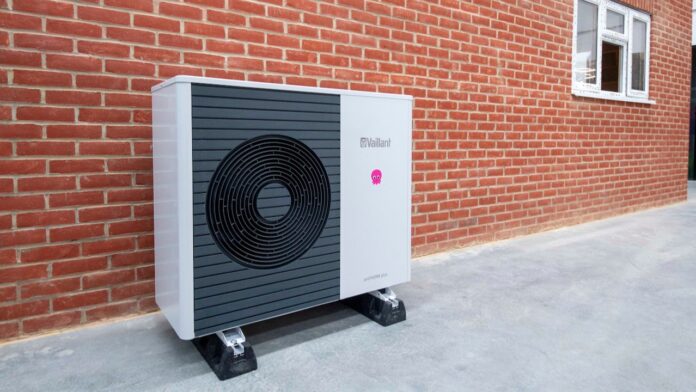Queen’s Speech: energy experts explain why new government scheme is failing cost of living crisis
- Queen’s Speech addresses easing cost of living as the government’s priority;
- Experts explain why the new Boiler Upgrade Scheme grants is failing all but those who can already afford high upfront costs;
- Heat pumps are extremely energy-efficient and eco-friendly, but unsuitable for the vast majority of UK homes;
- Installation costs can rise up to £35,000, compared to £2,000 for hydrogen-ready boilers.
On Tuesday, Prince Charles delivered the Queen’s Speech in Parliament, highlighting that the government’s priority is to “grow and strengthen the economy and help ease the cost of living for families”. He also said that the government would propose a new energy bill that aims to “deliver the transition to cheaper, cleaner, and more secure energy”. The two aspects are naturally interconnected, and energy experts are critical of the government’s Boiler Upgrade Scheme (BUS) that is being rolled out this month as unfit for most UK consumers.
On May 23rd, the government will open BUS applications that offers grants for switching to greener heating alternatives. Through BUS, consumers can get £6,000 off the cost and installation of a ground source heat pump, £5,000 for an air source heat pump, and £5,000 for a biomass boiler. The latter, however, only applies to rural areas and properties that are off the gas grid.
On paper, the aim of the scheme is to reduce the UK’s CO2 footprint. It would also decrease the UK’s dependence on gas. Moreover, a ground source heat pump, for example, increases the value of a property, is extremely energy efficient and may, in turn, reduce one’s council tax bill.
How realistic it is to have a heat pump installed is an entirely different story. Experts from Boiler Central explain that the two biggest downsides of heat pumps are incompatibility with most homes and, when compatible, still extremely high upfront costs, even with a government grant. The latter is an issue for at least 28% of UK residents, who think that improving their home’s energy efficiency would cost too much, according to the most recent survey from the Office for National Statistics regarding energy efficiency in Great Britain.
Heating expert Myles Robinson from Boiler Central explains the pros and cons of switching to ground source or air source heat pumps:
“As you can tell from the name, the way in which ground source and air source heat pumps work is by collecting heat either from the ground or the air.
PROS
“If your home is suitable for ground source heat pumps, they are perfect especially for underfloor heating. Compared to air source ones, they provide more renewable heating, capable of drawing more heat for less effort and require little-to-no electricity to run. They are also far less dependent on the weather, compared to air source heat pumps which struggle to draw warmth from cooler air temperatures, just when you need the heating the most.
“Conversely, considering the hot summers we have had in the past few years, if your home is suitable for either an air source or a ground source heat pump, you will be glad to know that both of them can double as cooling systems.
“Once installed, ground source heat pumps can last up to 25 years, compared to weather-battered air source heat pumps that only last a decade. Gas boilers last around 15 years.
“It seems counterintuitive, but ground source heat pumps generally do not require planning permissions, which may likely be the case for air source heat pumps. That is because the latter can change the exterior of a property and generate some noise pollution. Meanwhile, ground source heat pumps, though you will need to have a hole dug into the ground, do not change the exterior of a property.”
CONS
“Now let’s dive into the cons, which sadly render installing heat pumps unrealistic for a lot of UK homes. First of all, the costs are immense, and these can multiply if some parts of your existing heating system are incompatible with the heat pump system, such as radiators, emitters or any pipework. Ground source heat pump installation costs can add up to an eyewatering £35,000, of which the government can slash £6,000 off through the Boiler Upgrade Scheme. Compared to a £2,000 hydrogen-ready boiler and even £7,000 for an air source heat pump, this is clearly out of most people’s reach.
“Assuming you have the funds, do not expect that you are in the clear. Unfortunately, not every home is suitable for heat pump installation. If you live in a flat above ground level, for example, you obviously have nowhere to dig a hole for the ground source heat pump, nor is it worth bothering to get planning permission for an air source heat pump that will last you less than a boiler, which you will need anyway for when it is cold outside and the pump struggles to extract heat.
“Let’s say you have enough funds, you have the space and the planning permissions for either heat pump and you are committed to lowering your carbon footprint. You probably already have a combi boiler or a hydrogen-ready boiler which means that, unfortunately, you do not qualify for the BUS grant because the government deems those with already low-carbon heating systems ineligible. Nor are new build properties, unless you are building your own home.
“The reality is that most homeowners are looking for immediate solutions to cutting their gas bills because of the cost-of-living crisis. They most certainly do not have tens of thousands of pounds to spare. The Boiler Upgrade Scheme is not for them – it is for those who can already afford the significant upfront costs of a greener heating system.”
Who is eligible for BUS?
BUS runs across England and Wales for owners of both domestic and small non-domestic properties. They need to be switching from a fossil fuel system, meaning those with an already low-carbon heating system do not qualify for the grant. Other requirements include having an insulation capacity of up to 45kWth and a valid Energy Performance Certificate without any outstanding recommendations for loft or cavity wall insulation, unless exempt.
Help keep news FREE for our readers
Supporting your local community newspaper/online news outlet is crucial now more than ever. If you believe in independent journalism, then consider making a valuable contribution by making a one-time or monthly donation. We operate in rural areas where providing unbiased news can be challenging. Read More About Supporting The West Wales Chronicle
























